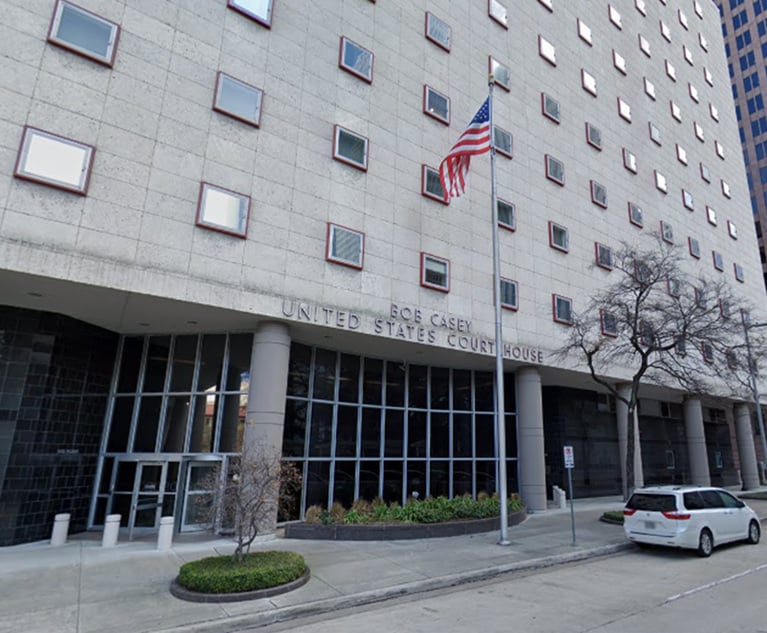'Change Frightens Us All:' Utah Justice Himonas on Why Deregulation, Innovation Still the Path Forward for Law
Utah Justice Deno Himonas says deregulation is one path forward to solving the access-to-justice crisis he says the country is facing. Others may be through technology or innovations yet imagined. He encourages other states to have these discussions.
January 09, 2020 at 01:10 PM
4 minute read
 Scott M. Matheson Courthouse, home of the Utah Supreme Court. (photo: Wikipedia)
Scott M. Matheson Courthouse, home of the Utah Supreme Court. (photo: Wikipedia)
Utah has been a leader in the growing movement across the United States to deregulate law firm ownership rules. At our Legal Business Strategy conference at Legalweek NY next month, we will spend some time digging into what these changes mean for law firms, clients, law companies, the general public and more. In this Q&A, we check in with Utah Supreme Court Justice Deno Himonas on what he and others have been doing in Utah and what deregulation means to him.
The American Lawyer: Can you share with us the latest updates on the changes to attorney ethics rules in Utah regarding loosening restrictions on nonlawyer involvement in the practice of law?
Justice Himonas: In August of 2019, the Utah Supreme Court adopted the recommendations of a joint Utah Supreme Court and Utah State Bar task force to (A) pursue changes to ethical restrictions on outside ownership, fee sharing and advertising and solicitation and (b) establish a legal sandbox to test innovative structures and mechanisms for the practice of law. The Supreme Court subsequently formed a new task force to pursue and implement these recommendations. That task force has been moving apace.
TAL: What was the motivation behind making these changes and why do you think Utah was a leader in this space?
JH: The motivation is straight-forward: there is an access-to-justice crisis in the United States and something has to be done about it. Past efforts to address the crisis (e.g., volunteerism) have not made a dent; indeed, the crisis has worsened. In response, in Utah we have made a sustained and concerted effort to create a new legal ecosystem in an effort to try and really address the problem. To this end, and among other efforts, we have recently licensed paralegals to independently practice law in the areas of family, landlord/tenant, and debt collection law; built and piloted an online dispute resolution system for small claims courts; and, most recently, undertaken regulatory reform.
TAL: Who will be impacted by these changes?
JH: It is our genuine hope and belief that everyone, including lawyers, will benefit from these innovations.
TAL: Have you or others involved in these changes experienced any pushback, and, if so, by whom?
JH: Of course, change frightens us all.
TAL: Do you think more jurisdictions should be exploring the idea of loosening regulations on who can be involved in the practice and business of law?
JH: Absolutely! But more broadly, I would encourage the relevant bodies in each state to undertake an examination of the access-to-justice crises and to offer up potential responses. Perhaps these responses will include loosening regulations, perhaps they will focus on technology, perhaps they will offer approaches that we have yet to think about and discuss.
TAL: In thinking of your session at the Legal Business Strategy conference what would be the key message you'd want to ensure those interested in this subject understand?
JH: The current state of affairs is not sustainable and threatens our core value of being governed by the rule of law. We have to come together and offer the public a more accessible and affordable system of justice.
 For more on this topic, sign up to attend Legal Business Strategy. The session on this topic takes place Feb. 4 from 2-3pm EST. Other speakers include moderator Ralph Baxter and panelists, Andrew Arruda of ROSS and the Institute for the Advancement of the American Legal System; Vice Chief Justice Ann A. Scott Timmer of the Arizona Supreme Court; and Professor Rebecca Sandefur of Arizona State University, along with Justice Himonas.
For more on this topic, sign up to attend Legal Business Strategy. The session on this topic takes place Feb. 4 from 2-3pm EST. Other speakers include moderator Ralph Baxter and panelists, Andrew Arruda of ROSS and the Institute for the Advancement of the American Legal System; Vice Chief Justice Ann A. Scott Timmer of the Arizona Supreme Court; and Professor Rebecca Sandefur of Arizona State University, along with Justice Himonas.
This session will examine how the latest efforts around deregulation are different than ones in the past. Who stands to benefit and who will face increased competition? What type of investments are we expecting? Where will this spread next?
This content has been archived. It is available through our partners, LexisNexis® and Bloomberg Law.
To view this content, please continue to their sites.
Not a Lexis Subscriber?
Subscribe Now
Not a Bloomberg Law Subscriber?
Subscribe Now
NOT FOR REPRINT
© 2025 ALM Global, LLC, All Rights Reserved. Request academic re-use from www.copyright.com. All other uses, submit a request to [email protected]. For more information visit Asset & Logo Licensing.
You Might Like
View All
Law Firms Expand Scope of Immigration Expertise Amid Blitz of Trump Orders
6 minute read
Am Law 100 Lateral Partner Hiring Rose in 2024: Report

KPMG's Bid to Practice Law in U.S. on Indefinite Hold, as Arizona Justices Exercise Caution

JCPenney Seeks Return of More Than $1.1M From Jackson Walker For Bankruptcy Work
3 minute readTrending Stories
- 1Being a Profession is Not Malarkey
- 2Bring NJ's 'Pretrial Opportunity Program' into the Open
- 3High-Speed Crash With Police Vehicle Nets $1.6 Million Settlement
- 4Embracing a ‘Stronger Together’ Mentality: Collaboration Best Practices for Attorneys
- 5Selling Law. How to Get Hired, Paid and Rehired
Who Got The Work
J. Brugh Lower of Gibbons has entered an appearance for industrial equipment supplier Devco Corporation in a pending trademark infringement lawsuit. The suit, accusing the defendant of selling knock-off Graco products, was filed Dec. 18 in New Jersey District Court by Rivkin Radler on behalf of Graco Inc. and Graco Minnesota. The case, assigned to U.S. District Judge Zahid N. Quraishi, is 3:24-cv-11294, Graco Inc. et al v. Devco Corporation.
Who Got The Work
Rebecca Maller-Stein and Kent A. Yalowitz of Arnold & Porter Kaye Scholer have entered their appearances for Hanaco Venture Capital and its executives, Lior Prosor and David Frankel, in a pending securities lawsuit. The action, filed on Dec. 24 in New York Southern District Court by Zell, Aron & Co. on behalf of Goldeneye Advisors, accuses the defendants of negligently and fraudulently managing the plaintiff's $1 million investment. The case, assigned to U.S. District Judge Vernon S. Broderick, is 1:24-cv-09918, Goldeneye Advisors, LLC v. Hanaco Venture Capital, Ltd. et al.
Who Got The Work
Attorneys from A&O Shearman has stepped in as defense counsel for Toronto-Dominion Bank and other defendants in a pending securities class action. The suit, filed Dec. 11 in New York Southern District Court by Bleichmar Fonti & Auld, accuses the defendants of concealing the bank's 'pervasive' deficiencies in regards to its compliance with the Bank Secrecy Act and the quality of its anti-money laundering controls. The case, assigned to U.S. District Judge Arun Subramanian, is 1:24-cv-09445, Gonzalez v. The Toronto-Dominion Bank et al.
Who Got The Work
Crown Castle International, a Pennsylvania company providing shared communications infrastructure, has turned to Luke D. Wolf of Gordon Rees Scully Mansukhani to fend off a pending breach-of-contract lawsuit. The court action, filed Nov. 25 in Michigan Eastern District Court by Hooper Hathaway PC on behalf of The Town Residences LLC, accuses Crown Castle of failing to transfer approximately $30,000 in utility payments from T-Mobile in breach of a roof-top lease and assignment agreement. The case, assigned to U.S. District Judge Susan K. Declercq, is 2:24-cv-13131, The Town Residences LLC v. T-Mobile US, Inc. et al.
Who Got The Work
Wilfred P. Coronato and Daniel M. Schwartz of McCarter & English have stepped in as defense counsel to Electrolux Home Products Inc. in a pending product liability lawsuit. The court action, filed Nov. 26 in New York Eastern District Court by Poulos Lopiccolo PC and Nagel Rice LLP on behalf of David Stern, alleges that the defendant's refrigerators’ drawers and shelving repeatedly break and fall apart within months after purchase. The case, assigned to U.S. District Judge Joan M. Azrack, is 2:24-cv-08204, Stern v. Electrolux Home Products, Inc.
Featured Firms
Law Offices of Gary Martin Hays & Associates, P.C.
(470) 294-1674
Law Offices of Mark E. Salomone
(857) 444-6468
Smith & Hassler
(713) 739-1250










